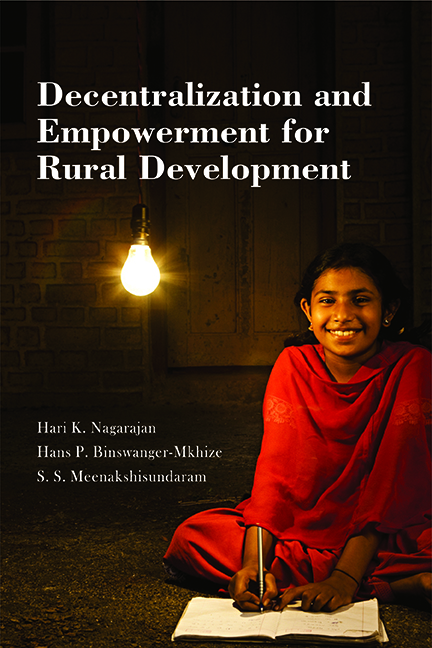Book contents
- Frontmatter
- Contents
- List of Tables and Figures
- Foreword 1
- Foreword 2
- Preface
- 1 Introduction
- 2 Decentralization: Cross-country Experiences
- 3 Thinking about Decentralization in India: 73rd Amendment and Beyond
- 4 Literature
- 5 An Overview of the Data
- 6 Analytical Approaches and Econometric Methods Used
- 7 Can Panchayats Improve the Quality of Services? Some Qualitative Evidence
- 8 Impact of Political Reservations for Women in Panchayats
- 9 Importance of Individual Empowerment of Women
- 10 Governance, Service Provision and Development Outcomes
- 11 The Impact of Fiscal Grants on Tax Efforts of Village Panchayats
- 12 Incidence of Identity-based Voting and Bribes in Panchayats
- 13 Panchayats and Household Vulnerability
- 14 Key Findings, Conclusions and Policy Recommendations
- References
- Index
- About the Authors
7 - Can Panchayats Improve the Quality of Services? Some Qualitative Evidence
Published online by Cambridge University Press: 30 November 2022
- Frontmatter
- Contents
- List of Tables and Figures
- Foreword 1
- Foreword 2
- Preface
- 1 Introduction
- 2 Decentralization: Cross-country Experiences
- 3 Thinking about Decentralization in India: 73rd Amendment and Beyond
- 4 Literature
- 5 An Overview of the Data
- 6 Analytical Approaches and Econometric Methods Used
- 7 Can Panchayats Improve the Quality of Services? Some Qualitative Evidence
- 8 Impact of Political Reservations for Women in Panchayats
- 9 Importance of Individual Empowerment of Women
- 10 Governance, Service Provision and Development Outcomes
- 11 The Impact of Fiscal Grants on Tax Efforts of Village Panchayats
- 12 Incidence of Identity-based Voting and Bribes in Panchayats
- 13 Panchayats and Household Vulnerability
- 14 Key Findings, Conclusions and Policy Recommendations
- References
- Index
- About the Authors
Summary
In chapter 5, it was found from the REDS data – that there have been improvements in service provision, access and quality. Such improvements have been modest in most cases. For example, average teacher absenteeism has reduced but is still quite high. The time spent by members of the households in fetching water has declined and a significant number of households in villages now have access to drinking water. However, this evidence is not a conclusive proof that the panchayats were the causal factor in engendering these changes. This chapter begins to explore whether panchayats can help in improved quality of service provision. Qualitative methods are used to examine whether panchayats can succeed in effective management of services specifically, can PRIs be used to provide services such as water and manage education? To what extent and under what conditions will these institutions succeed?
The 73rd constitutional amendment has strengthened the legal and formal structure to the PRIs. It was expected that by adequately empowering panchayats through devolution and promoting rural selfgovernance provision of services will become more efficient. Have panchayats been able to achieve this objective? To provide a few initial insights into the mechanics of service provision, Focus Group Discussions (FGDs), in which various stakeholders are brought together to evaluate and discuss the role of panchayats in service provision and management, were undertaken in two villages each of Maharashtra and Orissa. Maharashtra is industrially and economically more advanced compared to Orissa. It also is one of the states which initiated decentralized governance much before the constitutional amendment in 1992. Problems of water scarcity are common to both states, while the literacy rates in Maharashtra are higher. Both states have introduced legislations that provide improved management of water resources. pani panchayats have come into existence in these two states. The pani panchayat is a voluntary group of villagers engaged in the collective management (harvesting and equitable distribution) of water for drinking and/or irrigation. Meena Manch is an institution specific to Maharashtra to promote the education of girl children. Sarva Siksha Abhiyan has greatly energized the role of the panchayats in Maharashtra in matters related to management of schools while this is not the case in Orissa.
- Type
- Chapter
- Information
- Decentralization and Empowerment for Rural Development , pp. 127 - 145Publisher: Foundation BooksPrint publication year: 2014



